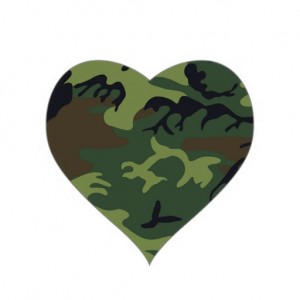Are members of our military the most romantic people in America?
 I’m going to bounce off of you a theory that’s been playing in my head. The genesis was a friend who told me that, while he was in military academy, he played a very romantic pop tune during a talent show and, rather than being the subject of jeers and insults, received very nice applause. My first thought, of course, was “That’s weird. Warrior types, especially the young ones, aren’t romantics.” My second thought, though, was that they may be America’s last true romantics, notwithstanding the fact that they don’t go around showing their feelings at the drop of a hat.
I’m going to bounce off of you a theory that’s been playing in my head. The genesis was a friend who told me that, while he was in military academy, he played a very romantic pop tune during a talent show and, rather than being the subject of jeers and insults, received very nice applause. My first thought, of course, was “That’s weird. Warrior types, especially the young ones, aren’t romantics.” My second thought, though, was that they may be America’s last true romantics, notwithstanding the fact that they don’t go around showing their feelings at the drop of a hat.
Patriotism is inherently romantic: The patriot loves his country. He’s not blind to her faults, but he still loves her. When he sees the flag wave, a warm feeling wells up inside of him. Patriotism may be founded in rational arguments — my country is more free, more safe, more wealthy, more naturally beautiful — but patriotism itself is an emotional response.
And who are America’s greatest patriots? Those who are willing to put their lives on the line for her. Sure, some troops are there for travel, or action, or adventure, or to satisfy some sick blood lust, but the vast majority, when asked, will say some variation of “I love my country.” If that isn’t a declaration of romance, I don’t know what is. So yes, these guys have “feelings,” perhaps more than the ordinary desk jockey who doesn’t care very much about anything other than baseball, beer, and sex.
A friend with whom I shared this theory fleshed it out a little for me. He pointed out that Leftists are romantic when it comes to politics — they fall in passionate love with their candidates. But this is easy love — it’s pop star love. They put nothing on the line for this shiny, plastic object of their affection.
Our troops, on the other hand, are willing to risk their lives to support their love of country. Now that’s a romantic….
A couple more random thoughts. Up until WWI killed the romance for the British middle and upper middle classes, there was a clear romantic thread running from the school boy immersed in the Victorian era’s neo-medievalism, with its emphasis on Knights and Fair Ladies, and the young man who enlisted on the war’s first day. Had WWI been less of an abattoir and more of an active war, with exhilarating pitched battles that allowed them to raise victorious flags over the battlefield, instead of being stultifying boredom in the trenches, leavened by bombs blowing up their beds or pointless charges across a No Man’s Land strewn with the dead and dying, that love might have survived WWI. Had that happened, Britain would not have become pacifist to the point of paralysis during the 1930s, a stance that provided an opening for Hitler to unleash his killing sprees.
Here’s one other thing I’ve observed about military men and Progressive men (because my world is filled with the latter): For all that the Left loves to paint troops as stone cold killers, the thing I’ve observed over the years is that men in the military are much more able to express their love and support for their spouses than are the Progressive men in my world. Obviously, this isn’t an across-the-board thing. I know Progressives who are open about their love and respect for their wives, and military men who were so locked down the word “love” never left their mouths. My theory is that this is because military men are (a) romantics and (b) sufficiently certain that, just by enlisting, they’ve proved their manliness. Expressing love for a woman is an extension of their personality without exposing them to the risk of losing their “man card.”
Meanwhile, liberal men already have a very tenuous grip at best on their man cards. Getting mushy about their wives might be something these publicly ardent “homophiles” (“I love gays, even thought I’m not one myself of course”) fear is “too gay” for them.
I will add one other thing — or rather, the friend with whom I shared this idea will add one more thing. It’s a follow-up on his insight about the Left’s love for political figures. Aside from the fact that this love doesn’t involve putting your life on the line, it also doesn’t involve making yourself emotionally vulnerable. Saying, “Oooh, I love Barack Obama,” doesn’t beget the response that “Barack Obama doesn’t love you back.” In the real world, though, saying “I love you” to someone is the equivalent of a dog showing its belly — it’s a dangerous, vulnerable position. Perhaps it takes a man who has proven his own bravery to himself, and therefore is willing and able to take that risk, to say those words, not just out loud, but in public.
